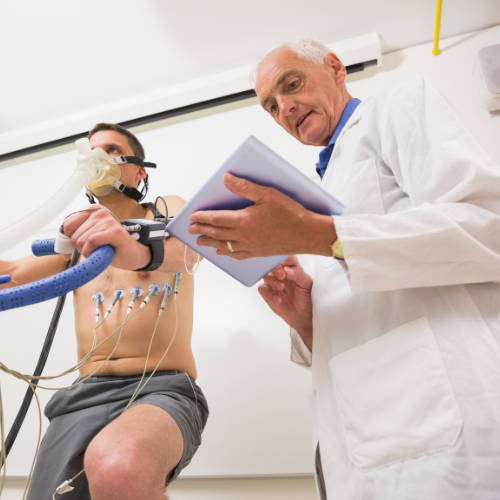
Stress Less, Sleep Better!
Stress Less, Sleep Better!
The article explores the bidirectional relationship between stress and sleep and how Optimal Breathing Techniques help you reduce your stress levels and sleep better.

Having trouble sleeping? You're not alone! According to the Centers for Disease Control and Prevention (CDC), a concerning 35.2% of US adults fall short of the recommended 7 hours of sleep per night.
No matter your age, gender, or profession, sleeplessness will throw your body systems off balance. Stress could be the reason behind your sleep deprivation, as stress and sleep are known to have a bi-directional (or two-way) relationship.
Let’s examine this bi-directional relationship between stress levels and sleep quality and then explore how heightened levels of stress can impact the quality of sleep and, conversely, how inadequate sleep can influence stress levels.
Understanding the Stress-Sleep Cycle
The American Psychological Association defines stress as “the physiological or psychological response to internal or external stressors.” When you’re under stress, your body responds by triggering the release of hormones that elicit the "fight-or-flight" reaction. This results in a rise in your heart rate, breathing rate, blood pressure, and muscle tension, and you start sweating more.
What Chronic Stress Does to Your Body
Now, you might have a question in mind: Is it normal to feel stressed occasionally? Yes. Acute stress or short-term stress is a regular coping mechanism of your body.
However, persistent stress, known as chronic stress, can potentially contribute to or exacerbate various physical and psychological issues, such as digestive disorders, headaches, anxiety, sleep disturbances, and other related symptoms.
One major consequence of stress is that it can result in sleep deprivation. Being frequently in a heightened state of alertness can delay the initiation of sleep and give rise to rapid, anxious thoughts during the night. Insufficient sleep, in turn, can exacerbate stress levels.
How Does Stress Impact Your Sleep?
Chronic stress disrupts the natural rhythm of the sleep-wake cycle. When you experience stress during the daytime, chances are higher that you will have trouble falling asleep and experience a decline in your sleep quality.
Moreover, stress may affect deep sleep and REM sleep, which are very important for maintaining your physical and mental well-being.
Did you know that stress can also influence the patterns and emotional aspects of your dreams?
Cortisol, the stress hormone, plays a crucial role in your sleep-wake cycle. Cortisol usually reduces at night to prepare for sleep.
Research shows that people with insomnia have higher cortisol levels in the evening, and this can be linked to increased nighttime awakenings. Further research is required to ascertain whether elevated cortisol levels directly contribute to insomnia or if sleep issues trigger an increase in cortisol levels.
Researchers have attributed short-term insomnia to the response to a stressful event, where the inability to sleep is seen as a natural reaction to a perceived threat.
This response activates the fight-or-flight mechanism, leading to immediate physiological changes that can disrupt sleep, such as muscle tension, increased heart rate, rapid breathing, and digestive system effects.
Fortunately, there is a positive correlation between reduced stress and improved sleep. In fact, a study revealed that the primary factor impacting sleep quality is not necessarily the level of stress experienced but rather the tendency to ruminate on stressful events.
How Does Sleep Impact Your Stress Levels?
As stated above, the relationship between sleep and stress is not a one-way street. Are you struggling to find a restful night’s sleep and waking up groggy and tired? Know that inadequate sleep has a profound effect on your stress levels and mood.
According to a study conducted by researchers at the University of California, experiencing just one night of sleeplessness can result in a significant 30% increase in emotional stress levels. This is attributed to the crucial role sleep plays in mood regulation and optimizing the functioning of the body and mind. When you don’t get sufficient sleep, your body is unable to effectively regulate stress levels.
Here’s the biological reason: Studies have demonstrated that sleep deprivation can cause a notable 37-45% rise in cortisol levels the subsequent evening. As mentioned earlier, elevated cortisol levels hinder sleep quality by triggering the body's fight-or-flight response.
The connection between stress and sleep is intricate, and inadequate sleep frequently results in heightened feelings of anxiety and stress, which ultimately leads to worsened sleep.
Breathe Better, Stress Less—The Role of Optimal Breathing
Have you ever wondered what the first step is in breaking the stress-sleep cycle?
It's simple: Reducing stress.
By finding ways to manage anxiety and stressful situations, you can establish a solid foundation for achieving restful sleep. While this may seem easier said than done, there's a powerful tool right under your nose–your breath.
When you’re under stress, you tend to take small, shallow breaths using your shoulders rather than utilizing the power of your diaphragm to move air in and out of your lungs. This breathing pattern disrupts your body’s O2-CO2 balance. This state of hyperventilation can make your stress symptoms even worse.
On the other hand, when you’re relaxed, you tend to take slow, deep breaths through your nose. Deliberately shifting upper chest breathing to diaphragmatic breathing invokes a relaxation response in your body, making it easier to deal with stress and anxiety.
Wondering how diaphragmatic breathing helps your body?
Here are a few of its benefits:
Decreased blood pressure and heart rate, promoting cardiovascular health.
Reduced levels of stress hormones circulating in the blood, helping to alleviate stress and anxiety.
Minimized lactic acid build-up in muscle tissue, aiding in muscle recovery and reducing muscle tension.
Better O2-CO2 balance
Improved immune system function
Increased physical energy
Increased feelings of tranquility and well-being
The Deepest Calm Program, included in the Optimal Breathing Self Mastery Kit, helps you master the art of breathing in the right way, lets any tension in your body slip away with each breath you take, and helps you break the vicious stress-sleep cycle. You will discover some serenity and finally fall asleep.
Related Reading
Kickstart your Calming, De-stressing and Relaxation Process

Meet Mike White
Meet Michael Grant White, the Optimal Breathing Coach and get actionable insights on your breathing development, health and longevity

How Good is Your Breathing?
Want to know the future of your health and longevity?
Most Popular Articles

April 12,2021

Feb 10, 2022

Attain satisfactory levels of exercise without aggravating existing heart.
Understand and explore EWOT - Exercise with Oxygen Therapy.
The Optimal Breathing
Self Mastery Kit
Breathing & Oxygen Articles
- Breathing
- Oxygen
- Mold Could Be in Your Home Right Now. Are You at Risk?
- Beat Work Stress the Right Way
- Bad Breathing Causes Asthma- Here's What to Do!
- Optimal Breathing, Autism & Brain Development
- Why Breathe Better? Bad Breathing Makes You sick or Sicker. Learn To Breathe Better Now
- Cure your Breathing Problems with Breathing Exercises
Meet & Work With Our Practitioners
Get personal help to improve your health
and vitality.
Get expert coaching and guidance from our Optimal Breathing experts.
Whether you are looking to have an Integral Breathwork expert, Voice Coach
or someone who specializes in anxiety or depression, look no further.





